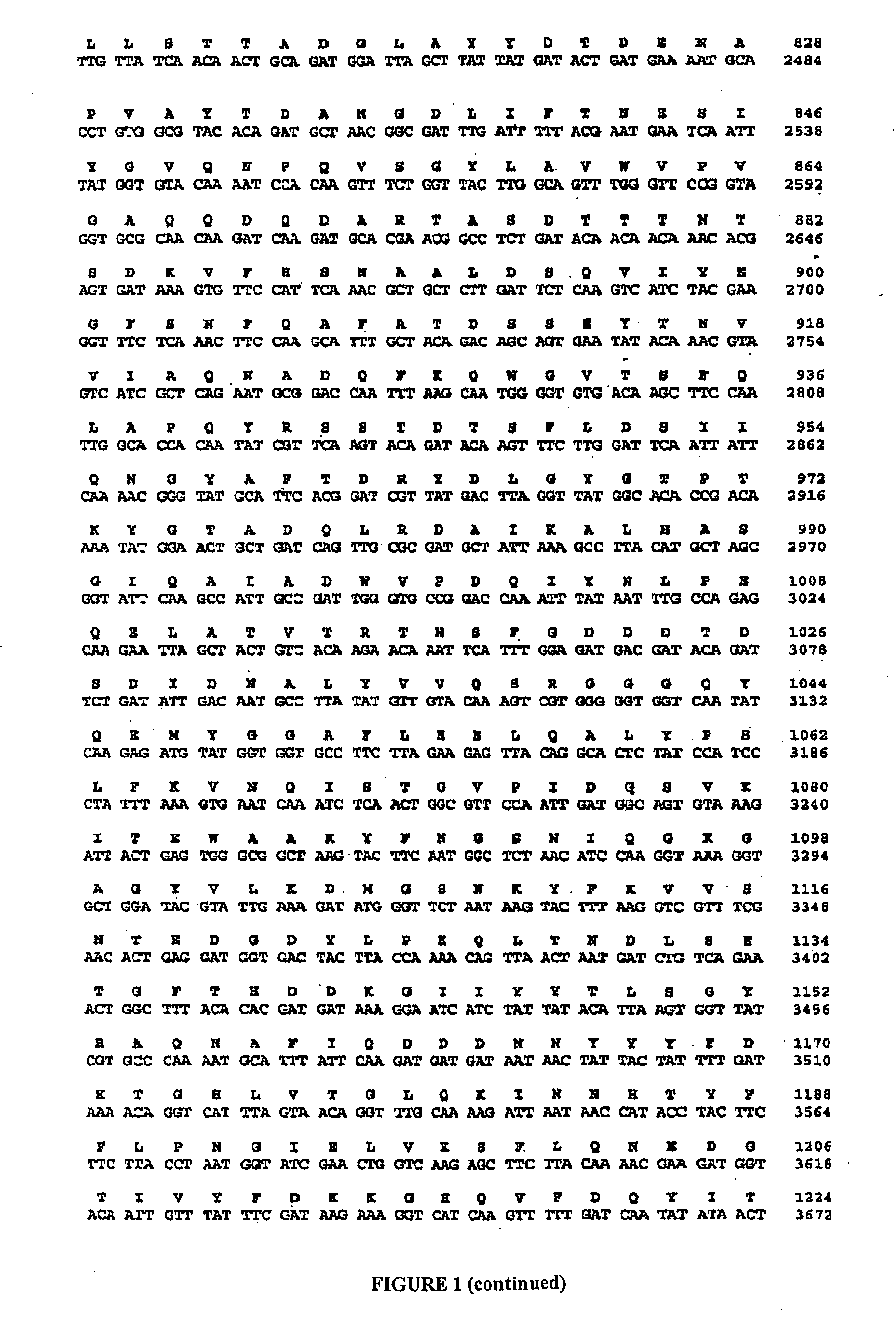Construction of New Variants of Dextransucrase DSR-S by Genetic Engineering
a technology of genetic engineering and dextransucrase, which is applied in the fields of peptides, enzymology, bulk chemical production, etc., can solve the problems of low yield, inability to direct synthesize smaller dextrans of 10000 to 100000 da,
- Summary
- Abstract
- Description
- Claims
- Application Information
AI Technical Summary
Benefits of technology
Problems solved by technology
Method used
Image
Examples
example 1
Construction of Variants
[0128]The pBad / TOPO Thiofusion vector (Invitrogen) was used for cloning and expressing truncated and / or mutated dsrS genes under the control of the L-arabinose promoter. It allows fusion of the gene to the 6×His tag at the C-terminal end, and to a thioredoxin tag at the N-terminal end.
[0129]For use as a matrix, genomic DNA from L. mesenteroides NRRL B-512F was extracted using the “Blood and Cell culture DNA maxi” kit (Qiagen). The strain is derived from the NCAUR collection, Peoria, Ill., USA.
[0130]One Shot TOP10 cells (Invitrogen) were used for expression of the truncated and / or mutated dsrS genes. The restriction enzymes were purchased from New England Biolabs and used in accordance with the manufacturer's instructions. DNA was purified using “QIAquick” (purification by PCR and gel extraction) and “QIAprep” (plasmid purification) kits from Qiagen.
[0131]The variants were constructed by PCR amplification of the DSR-S gene from genomic DNA from L. mesenteroide...
example 2
Production of Variants in E coli
[0138]Cultures were carried out in a baffled Erlenmeyer flask on 2×YT medium buffered to a pH of 6.4 with 100 mN of Tris-HCl, DSR-S being known to be unstable under alkaline pH conditions [3].
Composition of Medium 2X YT:
[0139]
Bactotryptone16 g / lYeast extract10 g / lNaCl 5 g / lTris12.1 g / l
[0140]E. coli TOP10 cells carrying pBad DSR-S vardel Δ4N and pBad DSR-S vardel Δ4N SEV663YDA plasmids were cultivated at 23° C. L arabinose induction was carried out when cell growth reached OD600 nm of 0.2 with 0.002% (w / v) of inducer. Culturing was stopped when cell growth reached a plateau (OD600nm of about 3-3.5) before starting the cell lysis phase.
[0141]E. coli TOP10 cells carrying pBad DSR-S vardel Δ3, pBad DSR-S vardel Core and pBad DSR-S Core AA plasmids were brought to 16° C. Induction was carried out when the cell growth reached OD600 nm of 0.2 with 0.005% (w / v) of L arabinose in the case of DSR-S vardel Δ3 and 0.02% (w / v) in the case of DSR-S vardel Core a...
example 3
Purification of DSR-S Vardel Δ4N Variant
[0144]Different enzymatic forms of DSR-S vardel Δ4N were produced during the culture of E. coli TOP10: a vastly major entire form and different degraded forms at the C-terminal end (FIG. 7). The origin of these degradations remains unclear. Production in Example 2 reached about 5500 U / l of culture in the sonication supernatants (activity assayed at 30° C.).
[0145]To determine the number of active enzymatic forms in the extracts, electrophoresis gels were produced under native or denaturing conditions. After gel re-naturing, it was incubated overnight at 25° C. in a sodium acetate buffer, 50 mM, pH 5.2 supplemented with 100 g / l of sucrose. The active enzymatic forms then synthesized polymer at the region to which they migrated in the gel. A reagent (Schiff's reagent) which specifically colored the polymers synthesized by active dextransucrases, after oxidation of primary alcohol functions of the periodic acid polymer was used and the gels were s...
PUM
| Property | Measurement | Unit |
|---|---|---|
| temperatures | aaaaa | aaaaa |
| temperatures | aaaaa | aaaaa |
| concentration | aaaaa | aaaaa |
Abstract
Description
Claims
Application Information
 Login to View More
Login to View More - R&D
- Intellectual Property
- Life Sciences
- Materials
- Tech Scout
- Unparalleled Data Quality
- Higher Quality Content
- 60% Fewer Hallucinations
Browse by: Latest US Patents, China's latest patents, Technical Efficacy Thesaurus, Application Domain, Technology Topic, Popular Technical Reports.
© 2025 PatSnap. All rights reserved.Legal|Privacy policy|Modern Slavery Act Transparency Statement|Sitemap|About US| Contact US: help@patsnap.com



